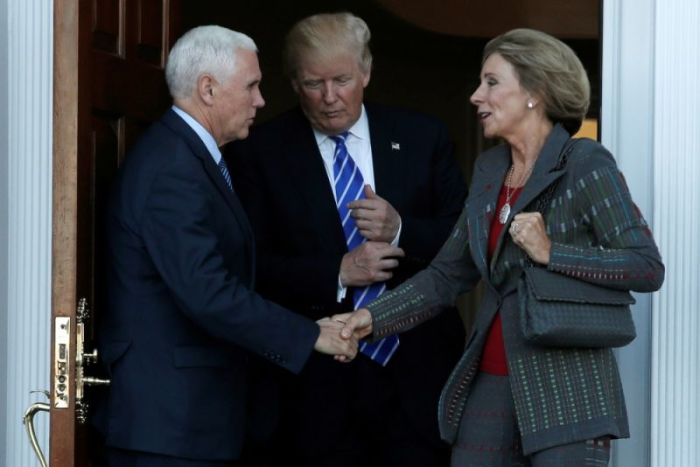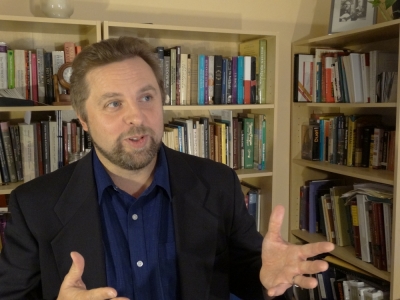Why Betsy DeVos, School Choice Represent the Future of Education

Lawrence Krauss, professor at Arizona State University, recently opined in The New Yorker that the Trump administration is declaring a "war on science." With the nomination of Betsy DeVos as education secretary, Krauss foregrounds education as part of this battle:
"DeVos is a fundamentalist Christian with a long history of opposition to science. If her faith shapes her policies — and there is evidence that it will — she could shape science education decisively for the worse, by systematically depriving young people, in an era where biotechnology will play a key economic and health role worldwide, of a proper understanding of the very basis of modern biology: evolution."
He goes on: "The purpose of education is not to validate ignorance but to overcome it. It should be easy, therefore, for Congress to make sure that DeVos isn't planning to drive our educational system off a scientific cliff."

Other than failing to provide a single example of DeVos' actual conflict with science, the irony here is that Krauss appears to be living in the past, rather oblivious to the cultural currents sweeping us into a post-secular society.
As the term intimates, a post-secular society in its most basic form involves the return of religion and religious values in the public square. We've seen this with the advent of Sharia councils in the U.K. that arbitrate between conflicts among Muslims, the resurgence of the Russian Orthodox Church as a major political, moral, and cultural force in the Russian Federation, the revival of imperial Shintoism at the highest levels of the Japanese government, a revitalization of Confucian philosophy among Chinese officials, Hindu nationalism in India, Islam in Turkey, and on and on.
In light of these changes, dogmatic appeals to science/religion dichotomies and the oft cited pejoratives (e.g. fundamentalists) that accompany such appeals appear increasingly a matter of question begging, recalcitrantly resistant to addressing a more complex understanding of the relationship between the twin spheres of science and religion. So much of this banter is rooted in rather outdated and largely discredited Enlightenment redefinitions of religion and knowledge that are not merely suffering the scourge of wider society, but also the critical eye of the academy. Post-secular scholars are fully sympathetic with the growing contemporary skepticism towards secular claims over reality and the professionalized partisanship, comprised of judges and journalists, pundits and professors that functions as its mediating priesthood.
Now that society is less inclined to cordon off religious viewpoints from public discussion, the challenge facing education today is to think anew how such viewpoints inform the programs and curricular offerings, as well as the mission, vision, and values of public classrooms.
There is further concern that the kind of knowledge offered by secularized education, inspired by its (faith!) commitment to scientific rationalism, is incurably sterile, indifferent, and apathetic, devoid of the capacity to awaken the moral imagination so central to human development.
And so schools are increasingly turning to traditions such as contemplative practices as part of their curriculum offerings. Examples of such include mindfulness meditation, which is a Zen Buddhist-inspired practice akin to prayer, as taught in MindUP programs in schools throughout the nation. Such mindfulness has been called by Emily Horn the "new American religion."
But more to the point, populations are taking matters into their own hands with the passage of school choice initiatives, which have the potential to change dramatically the national landscape of what is considered public education. For example, in Louisiana's program, 86% of those who received vouchers used them to enroll in private and parochial schools. It would seem rather obvious that devout practitioners of the classical monotheistic faiths such as Christianity and Judaism can hardly consent to the reductionist privatization of their convictions. Vouchers free populations to educate according to their own (often traditional) values.
And school choice is proving to be an issue capable of amassing a remarkably diverse constituency of supporters. Who would ever have imagined the Republican Senator and former presidential candidate Ted Cruz sharing the stage in solidarity with the ultra-liberal Democrat Representative Sheila Jackson Lee? But this is happening across the political spectrum with school choice. And with Trump's proposal to redirect $20 billion in federal education spending to school choice initiatives, it does appear that the nation is moving away from the monolithic secular curriculum envisioned by Krauss.
What all of this means of course is that with her support for school choice and the charter school movement, DeVos is far more in touch with current social and educational trends than is Krauss. In many respects, then, his article is little more than a partisan exhortation seeking to rouse his fellow troops for battle, garnered to defend faithfully the beliefs of a secular age. But if current social and educational trends continue, his call to arms aside, it does appear that the war has already been decided.




























